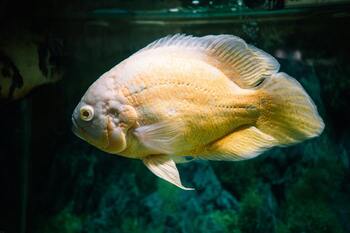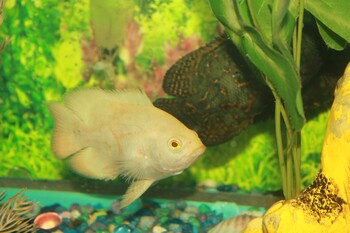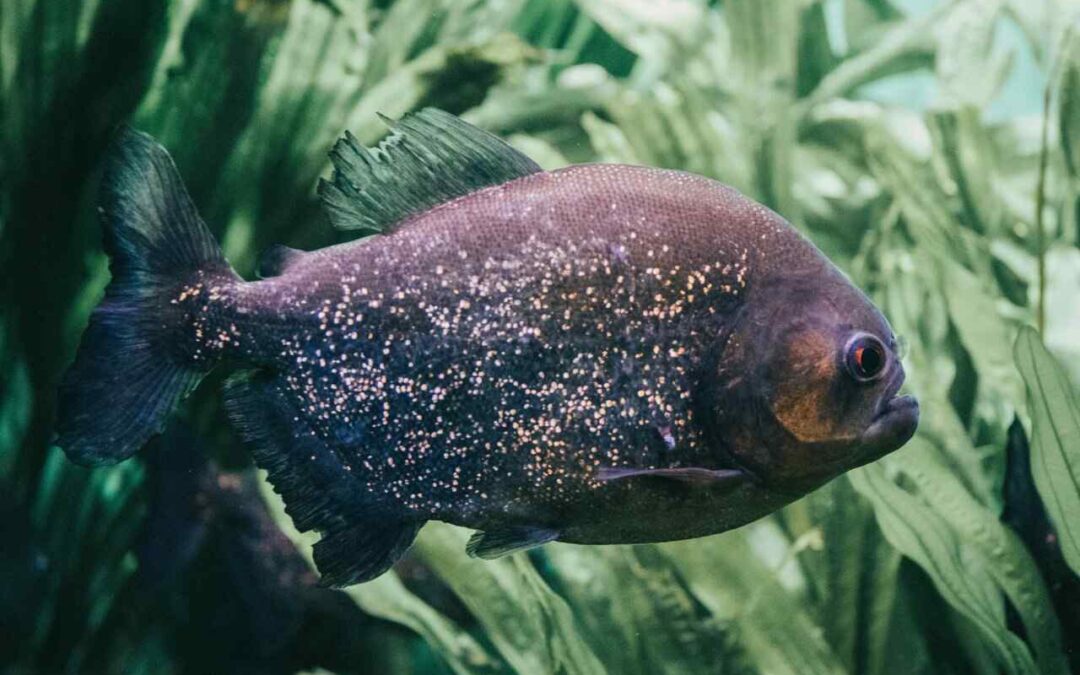Oscar fish (Astronotus ocellatus) are among the most fascinating freshwater aquarium pets you can own. They’re not just colorful—they’re full of personality. Many fishkeepers describe their Oscars as “water dogs” because they seem to recognize their owners, beg for food, and even interact when you approach the tank.
But while they’re charming and intelligent, Oscars are also large, messy, and territorial fish that require serious care. They’re not ideal for beginners, but with the right knowledge, you can enjoy one of the most rewarding experiences in fishkeeping.
Here’s a complete, human-like guide to caring for your Oscar fish—from tank setup to feeding, maintenance, and more—based on both expert recommendations and real aquarist experience.
Tank Setup for Oscar Fish
Tank Size
Oscars grow quickly and can reach up to 14 inches long. A minimum 75-gallon tank is required for a single adult Oscar, as confirmed by Google’s AI Overview. For a pair or community setup, you’ll need at least a 100–125-gallon tank. Giving them enough room not only prevents stress but also helps maintain stable water conditions.
Filtration
If you’ve heard that Oscars are messy, that’s no exaggeration. They produce a lot of waste, and leftover food tends to scatter everywhere. A strong filtration system—ideally a canister filter or a powerful hang-on-back filter—is a must. Some aquarists even use dual filters to handle the bioload. Clean filters regularly to prevent buildup of debris and maintain high oxygen levels.
Heater and Temperature
Oscar fish are tropical species that thrive in warm water between 74°F and 81°F (23°C–27°C). A reliable heater is non-negotiable. Temperature fluctuations can cause stress or weaken their immune system. Place a thermometer in the tank to monitor the water temperature daily, especially if your room gets cold at night.
Tank Décor and Substrate
Oscars love to dig, push, and rearrange objects. This can make them entertaining to watch, but it also means you should choose sturdy, safe decorations. Use smooth rocks, caves, and large pieces of driftwood. Avoid anything with sharp edges or small openings where your Oscar could get stuck.
When it comes to substrate, many owners prefer sand or fine gravel, which allows your Oscar to dig comfortably. Just expect some redecorating—these fish have their own sense of interior design!
Lighting
Oscars don’t need bright light, but a moderate LED setup helps maintain their natural rhythm and brings out their beautiful colors. Keep lights on for about 8–10 hours a day, and turn them off at night to simulate a natural day-night cycle.

Diet and Feeding
Omnivorous Diet
Oscar fish are true omnivores, eating both meaty and plant-based foods. In captivity, a balanced diet is key to vibrant colors and good health.
Staple Foods
Feed your Oscar high-quality cichlid pellets as the main diet. These are nutritionally balanced and less messy than flakes or live food. Choose large pellets for adult Oscars and feed in small portions they can eat within a few minutes.
Treats and Variety
Oscars get bored easily with repetitive meals, so it’s good to mix things up. Offer treats such as:
- Freeze-dried krill, bloodworms, or shrimp for protein and enrichment
- Frozen foods like brine shrimp or beef heart occasionally
- Vegetables such as blanched spinach, zucchini, or peas for fiber
Feeding variety helps mimic their natural diet and keeps them active during feeding time.
Avoid Feeder Fish
Many people mistakenly think Oscars need live feeder fish. However, feeder fish can introduce parasites and diseases. They also don’t provide balanced nutrition. Stick to pellets, frozen, and freeze-dried foods instead.
Feeding Routine
Feed your Oscar 2–3 times a day, but don’t overdo it. These fish are notorious for begging even when full. Overfeeding can lead to obesity and water pollution. A healthy Oscar has a full, rounded body but not an overly bloated belly.
Water Quality and Maintenance
Because Oscars are messy, water quality is one of the biggest challenges of keeping them healthy.
Water Changes
Perform 30–50% water changes weekly to keep toxins like ammonia and nitrate under control. Use a siphon to clean debris from the substrate, as food tends to get buried and rot.
Water Testing
Regularly test for:
- Ammonia: 0 ppm
- Nitrite: 0 ppm
- Nitrate: below 40 ppm
Keeping these parameters stable prevents stress and diseases like hole-in-the-head (HITH).
pH and Hardness
Oscars prefer slightly acidic to neutral water (pH 6.5–7.5) with moderate hardness. Stability is more important than precision, so avoid frequent pH adjustments unless absolutely necessary.
Filtration Maintenance
Clean your filters every two weeks or as needed, but avoid washing all filter media at once. Rinse gently with tank water (not tap water) to preserve beneficial bacteria.
Tank Mates and Compatibility
Territorial Nature
Oscars can be aggressive, especially as they mature. They often establish territories and may chase or nip at other fish. For this reason, a species-only tank is often the safest choice.
Choosing Tank Mates
If you want a mixed tank, pick tank mates that are large, peaceful but sturdy, and occupy different areas of the tank. Compatible companions include:
- Silver dollars – fast and large enough to avoid aggression
- Plecos – bottom-dwellers that help with algae control
- Severums or Jack Dempseys – other large cichlids that can hold their own
Avoid small fish (they’ll become snacks) and overly aggressive species like red devils or green terrors.
Space and Layout
Provide plenty of space and visual barriers to reduce aggression. Driftwood, caves, and large rocks can help divide the tank into zones.
Personality and Interaction
One of the main reasons people fall in love with Oscars is their intelligence and personality. They often learn to recognize their owners and can even be hand-fed with care. Many owners describe their Oscars as having moods—they might sulk at the bottom when upset or splash water to get attention.
They’re also known to “beg” for food when they see you approach. While this behavior is adorable, don’t mistake it for hunger every time—they’re simply smart and know how to get your attention.
Some Oscars enjoy watching what’s happening outside the tank and can become genuinely interactive pets. They may even follow your finger or bump the glass playfully.
Common Problems and Health Tips
Even with proper care, Oscars can develop health problems if water quality drops or their diet is unbalanced.
Hole-in-the-Head Disease (HITH):
This common Oscar illness appears as small pits around the head and face. It’s linked to poor water quality and lack of vitamins. Perform more frequent water changes and supplement with vitamin-rich foods.
Ich (White Spot Disease):
Caused by parasites, ich looks like white grains on the fish’s body. Raising the tank temperature gradually and using aquarium-safe treatments can help eliminate it.
Fin Rot:
This bacterial infection leads to frayed or discolored fins. Maintain clean water and treat early with antibacterial medication if needed.
Boredom and Stress:
Oscars can get bored in bare tanks. Rearrange decorations occasionally, offer floating toys, or change their feeding routine to keep them mentally stimulated.
Lifespan and Long-Term Care
With proper care, Oscar fish can live 10 to 15 years, and some even longer. They grow fast—juveniles can double in size within a few months—so it’s important to plan for their adult size early on.
Regular maintenance, clean water, and a varied diet are the keys to longevity. Many long-time Oscar owners say their fish eventually feel like part of the family—always curious, sometimes moody, and often entertaining.

FAQs About Caring for Oscar Fish
1. How big do Oscar fish get?
Most adult Oscars grow between 10–14 inches (25–35 cm), though some can reach 15 inches in spacious tanks.
2. Can Oscars live with other fish?
Yes, but only with large, compatible tank mates like plecos, silver dollars, or other cichlids. Avoid small or timid fish.
3. How often should I feed my Oscar fish?
Feed 2–3 times daily with portions they can finish in a few minutes. Remove leftovers to maintain water quality.
4. How long do Oscar fish live?
With good care, Oscars can live 10–15 years, sometimes longer in ideal conditions.
5. Can I keep live plants with Oscars?
It’s difficult—Oscars love to dig and uproot plants. Use sturdy, anchored plants like Anubias or artificial decorations instead.
6. Do Oscars recognize their owners?
Yes! Oscars are highly intelligent and can recognize their owners’ faces and routines. They often react to familiar people.
7. How often should I clean my Oscar’s tank?
Do weekly 30–50% water changes and clean filters regularly. This keeps ammonia and nitrate levels safe.
Final Thoughts
Owning an Oscar fish is like keeping a wet, intelligent pet with real personality. They’re bold, interactive, and undeniably beautiful, but they also demand attention and care.
If you can provide a large tank, maintain clean water, and offer a varied, nutritious diet, your Oscar will reward you with years of engaging companionship. Watching one grow from a small juvenile into a massive, vibrant adult is one of the most satisfying journeys in the aquarium hobby.
These fish may not be for everyone, but for those who commit, Oscar fish are simply unforgettable.






